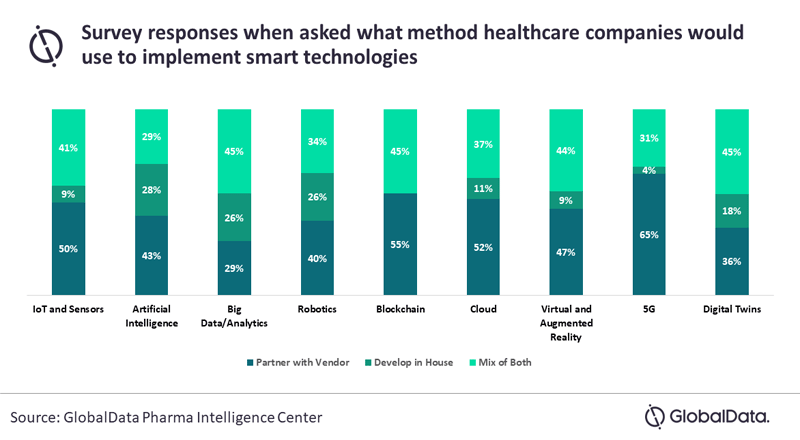| As pharma companies continue to scale up digital transformation processes, a survey by GlobalData has highlighted that teaming up with experienced external vendors is driving innovative technology implementation. The leading data and analytics company notes that technologies such as 5G, IoT, sensors, blockchain, cloud and virtual/augmented reality were the top technologies for which pharma companies used external vendors, whereas they were more likely to develop artificial intelligence (AI), big data/analytics or robotics in house comparing to the rest of smart technologies.
The survey, which was published in GlobalData’s latest report, ‘Smart Pharma’, revealed that the majority of healthcare professionals would turn to external vendors to implement 5G to their processes, at 65% of respondents. This was followed by Blockchain at 55% and IoT and sensors at 50%. On the other hand, 28% of respondents would implement AI in house, followed by big data/analytics and robotics at 26% each.
Urte Jakimaviciute, Senior Director of Market Research at GlobalData, comments: “Implementing smart technologies into pharmaceutical processes requires substantial financial resources, time, and knowledge, especially since the speed of innovation is accelerating rapidly. As pharmaceutical companies continue to revamp their portfolios and digital transformation speeds up, partnering with technology providers becomes a natural step for the industry to take.
“Businesses are more likely to use external vendors to deploy technologies that are less widespread, have fewer use cases, or need to be implemented in short timeframes. While there is no way to slow down the digital transformation, a collaboration with external technology vendors may be a key to success.”
Jakimaviciute continues: “Partnering can enable not only faster adoption of the new technologies, but also bring substantial cost savings. External vendors tend to have specific domain knowledge, and are also fast to respond to any regulatory or compliance requirements that the pharmaceutical sector needs to adhere to.
“Pharma companies are already accustomed to working with external vendors to enhance processes in research and development (R&D), manufacturing and supply chain management. As the need to control the rising costs of pharmaceutical processes is becoming more pressing, leveraging smart technologies is expected to create more sustainable operational models and improve business agility. The companies that can optimize the processes faster are primed to succeed – this forces healthcare industry to pursue more open and collaborative approaches.”
In 2021, Boehringer Ingelheim signed a collaborative agreement with Google Quantum AI to implement quantum computing in pharma R&D; UCB and Microsoft announced a strategic collaboration to combine Microsoft’s computational services, cloud, and artificial intelligence (AI) with UCB’s drug discovery and development capabilities; Bristol Myers Squibb created a collaboration with Exscientia to use AI to accelerate the discovery. |
